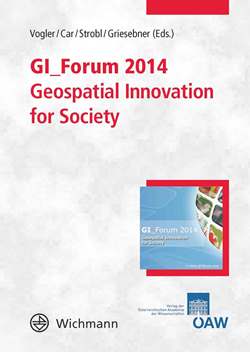 |
 |
Robert Vogler – Adrijana Car – Josef Strobl – Gerald Griesebner (Eds.)
GI_Forum 2014, Volume 2
Geospatial Innovation for Society – Conference Proceedings
Min Chen,
Hui Lin,
Deer Liu,
Zeqiang Chen,
Ying Bao,
Yulin Ding,
Xianzhi Hu
S. 140 - 143 doi: 10.1553/giscience2014s140
Verlag der Österreichischen Akademie der Wissenschaften
Abstract:
Natural resources such as land, air, and water lay a critical foundation for the sustainable development of an urban community. The Pearl River Delta (PRD) is one of the most developed and rapidly developing regions in China, with abundant natural resources in water, intertidal zones, aquatic products, and a significant coastal estuary habitat. The PRD also covers two Special Administrative Regions (Hong Kong and Macao) and two Special Economic Zones (Shenzhen and Zhuhai), critically positioning it domestically and abroad. However, the increasing development of the economy has put pressure on the security of its water resources. These resources have sharply deteriorated in the PRD as the result of a mass and unordered overuse of water and soil resources and the lack of coordinated efforts among different functional departments. Various problems related to the water environment (such as flooding, rapid development of the deposition, water pollution, saltwater intrusion, and waterway atrophy) have directly threatened the social stability, sustainable development of the economy, and the supply of water in the region. To date, the population affected by a shortage of high-quality water has reached 16 million due to pollution of the water supply source in Guangdong province. At this time, the water pollution in the PRD has resulted in ever-increasing economic and environmental losses. Pollution coverage includes Hong Kong, Macao, and Guangdong and, because governmental functions and scientific technologies among these regions differ, there is little in the way of efficient, cooperative efforts to fully make use of their individual advantages to protect the water environment in the PRD. Moreover, the diversity and complexity of the problems even interfere with the abilities of functional departments within one region (e.g., flood prevention, pollution abatement, and channel maintenance) to make decisions and formulate protection policies using advanced spatial technologies such as remote sensing (RS) and geographic information systems (GIS). Consequently, the water environment in the PRD lacks unified and synergistic operations, and water resource protection is restricted to satisfying the demands of economic development and the requirements of sustainable development. To date, it is clear that cooperation amongst Guangdong, Hong Kong, and Macao should be strengthened. More research is also essential, specifically regarding the reduction of gross pollution emissions by 8 to 10 percent. In addition, the water environmental protection of the PRD has engaged with the Integrative Planning of the Environmental Protection in the PRD (2009-2020). This emphasizes strengthening the regional collaborative linkages, constructing an integrative platform of environmental monitoring, and realizing the shared and collaborative management of environmental information among different departments. With this in mind, the study on constructing a unified and synergistic system for water environment analysis in the PRD area are proposed as interdisciplinary and comprehensive research using multiple methods and fields. Based on the analysis of the fusion techniques of multisource, multi-date, and isomerous images, a database for integrating remote sensing monitoring data of water quality and quantity, actual measurement data, and relevant basic geographical data (watercourse data, section data, and a Digital Elevation Model) will be developed. Combining the research on general analytical methods and models, the capsulation mechanism of analytical methods and models will be designed. Lastly, using GIS integration techniques, an integrative monitoring demonstrative platform of water quality and quantity will be developed to assist collaborative research and decision making among the functional departments of the three regions. The goal is to promote the sustainable use of the water resources in the PRD, to achieve sustainable economic development and to increase the informatization of the PRD region. The construction of the system consists of four parts.
2014/06/18 12:02:13 Object Identifier:
0xc1aa5576 0x0030d41f
Rights:https://creativecommons.org/licenses/by-nd/4.0/
GIS as a technology has come a long way, from
the early adoption of technical wizardry to the
ubiquitous, if unconscious use by the masses. The
emergence of a GISociety is on its way through
technological development, theoretical and empirical
scientific research and inclusion of technology
into education with increasing pedagogical justification.
Defining new dimensions of hard- and software,
brainware and orgware are all needed to
further enhance the GISociety with new geospatial
innovations.
This issue of the Geoinformatics Forum (www.gi-forum.org)
links into these research areas. We are pleased to present
work by researchers who actively contribute to the
rising of geospatial innovations for society in theoretical,
empirical, technical, and educational terms.
This reflects that innovative alterations can only be
created though close interaction among the domains
of science, technology and education.
Topics of the 2014 issue therefore include:
• Innovations in geospatial technologies
• Advances in GIScience
• Monitoring global change
• Geoinformation for public health
• Education with digital earth
• Spatial Citizenship education
• Geospatial learning environments
The book is aimed at researchers and practioners
in the field of geoinformation with an academic,
industrial or educational background.
Work on this publication has been co-funded by the following projects and networks
funded by the European commission:
LLP-Comenius multilateral project SPACIT
(517908-LLP-2011-1-AT-COMENIUS-CMP)
|




 Home
Home Print
Print
 References
References
 Share
Share
